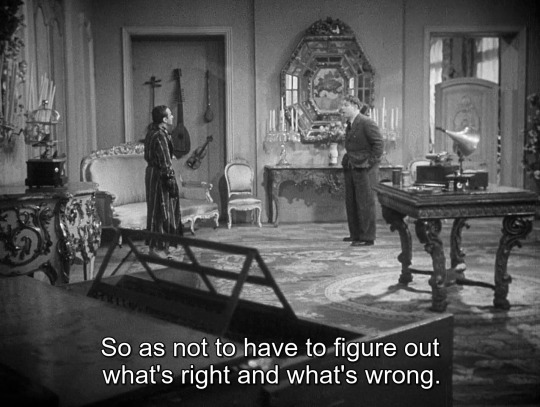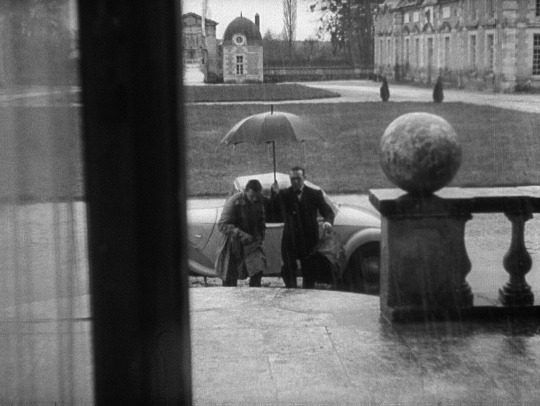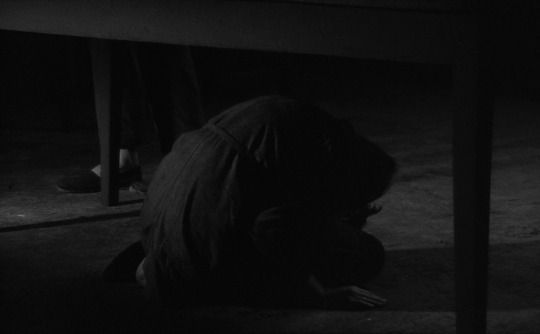#the rules of the game
Explore tagged Tumblr posts
Text

#polls#movies#The Rules of the Game#The Rules of the Game 1939#The Rules of the Game movie#30s movies#jean renoir#nora gregor#marcel dalio#paulette dubost#roland toutain#mila parély#have you seen this movie poll
33 notes
·
View notes
Text

The Rules Of The Game, Jean Renoir, 1939
111 notes
·
View notes
Text










"Listen, Christine. You throw yourself around people's necks like a 12-year-old. You can do it with me; you'll always be my little Salzburg girl. But with others, it can be... awkward." "So, in Paris, you can't show a man affection without..." "No." "No?" "No." "So I'm to blame for everything?" "Not everything. Just a few things."
Jean Renoir as Octave & Nora Gregor as Christine
in The Rules of The Game (orig. La règle du jeur; 1939), dir. Jean Renoir
#nora gregor#jean renoir#la règle du jeu#the rules of the game#1930s#filmgifs#filmedit#filmblr#moviegifs#movieedit#movieblr#me myself and gifs
27 notes
·
View notes
Text
The confines of a story
Any time you play a game, you need to know the rules. A puzzle has a border, you can't smash the pieces into a spot they don't fit with a hammer (I mean, you can, but it won't look right when you're done), etc.
My mental assumptions are that we are following the rules of stories as told in both novel form and video form. I'm not going to list ALL the rules associated with storytelling in both forms, because whole books and classes have been written about them and the parameters are way too big.
How do I know these rules? Well, I write novels, too. I'm not Neil Gaiman, (and I'm not going to go so far as to say I'm anywhere near his level, looking at you, Magic Trick OP), but the people who've read my books say they like them, so I think I do okay? I never went to school for any of it, but the library was and is my best friend, and I've read as many books and taken as many workshops as I can on this topic. Am I an expert? Nah. I know some stuff. There's always more to know.
So anyhow, some rules:
Rule one: the story has to be generally satisfying and not make people feel betrayed or angry. Hurt is fine, angry at the characters is fine, tricked is fine, but the reader can't feel betrayed or totally let down by the author at the end of the story. It's impossible to avoid this entirely, but most people in general have to agree that the story isn't a betrayal of the reader. The author needs to keep faith with their reader as best they can.
Rule two: in mysteries, all the cards need to be on the table at some point. Misdirection or downplaying of important information or use of double-meaning words are totally fair tactics, but the answer has to be there to be sussed out by a clever observer. (I got really mad when I tried to read murder mysteries for a little while. I figured this rule out very quickly on my own, and I could always spot the killer by the end of the second chapter. I gave up on murder mysteries. HOWEVER, another author I admire wrote a classic murder mystery-style book, and when I spotted the killer in chapter two like always, she had arranged matters so that the killer's motive was shrouded in deep mystery. I burned through that book to find out WHY he dunnit, and when the main character helped the killer escape at the end, I was troubled but satisfied.) But mah point is, all the pieces to the puzzle need to come in the box.
Rule three: (which isn't really a rule so much as an observation and something I myself struggle with), writing fiction can be very hard because people are naturally not good at knowing that other people do not know what they know. You know? Psychological studies have shown that when a person knows something, like where an object is, they develop this sort of assumption that the object's location is OBVIOUS, or that other people also know where the object is or can easily guess it, no matter how hard a time they had guessing it themselves before they were told. So not only do newer writers sometimes struggle to maintain what various characters do and don't know at different times in a story, readers can also struggle with the same thing. Gotta keep your eyes peeled for what information each character actually has, and also keep in mind how easy it is to be fooled when you think you have all the facts. I notice Neil and John taking advantage of this in Good Omens a lot -- the lies that Crowley and Aziraphale tell to the other angels and demons seem really obvious -- but that's because we know they are lying and what they're lying about. When we are lied to, we fall for it as easily as those angels and demons, because we assume we know what's going on. Watch out!
Rule four: you can't break the rules. If you're going to make a wild, avant garde, ground-breaking story, that's pretty much the whole point of the entire story. Twists are fine, emphasizing or de-emphasizing expected tropes or ideas is fine, subverting a trope is fine. Otherwise, you have to stick to ideas, formats, plots, structures, etc., that have come before. For example, just as I started seeing metas about the POV characters in Good Omens 2 jumping around, I had remembered an episode of the X-Files from way back where an "alien landing" is told from three characters' perspectives. When told from the POV of the alien conspiracy-believing kid, the story gets really weird with all kinds of wild things happening. When told from doubting Scully's perspective, it gets very boring and mundane. POV jumping is nothing ground-breakingly new. There won't be anything ground-breakingly new.
Rule five: it has to make sense. Mark Twain once said, "Of course truth is stranger than fiction. Fiction has to make sense." Once upon a time, a friend of mine who liked to embellish stories told me all about his new fiancee, who he'd met and proposed to all in a few months, who was head over heels for him, a gorgeous red-head, one of triplets. I never met this mystery woman, and then one day he called me to tell me she had died very suddenly and dramatically. I had my suspicions that she wasn't even real in the first place, so I made consoling noises and asked him when and where the funeral was so I could be there for him. I expected to be put off, told some crazy reason why there wouldn't be a funeral or it hadn't been planned yet and I would somehow mysteriously not hear about it until it was over. Instead, he gave me a date and location immediately. I was taken aback. I was even more taken aback when I arrived at the funeral to meet this woman's family, including the remaining red-headed pair from her triplet set, and hear all about what a whirlwind romance she'd had with my friend. If that had been a novel, I would have shut the book and told the author to give me a break. Books and TV and movies and plays can't push the consumers' credulity too much. Readers have to maintain their willingness to suspend their disbelief. It can't get too crazy. What's too crazy? Hard to say, it's kind a of a "I'll know it if I see it" sort of thing. And some people are certainly more willing to go along with something wild than others. The author can only try their best to maintain faith. To tell a story that can be believed.
Anyhow, I dunno if that's helpful at all, but it's sort of the litmus test I'm using to gage all my questions and theories. And what I'm using to shuffle in the metas and theories I like from others.
#long explanation#this is how my brain works for any who are curious#good omens#good omens 2#good omens fan theory#searching out the ineffable mystery#the rules of the game
29 notes
·
View notes
Text










La règle du jeu (The Rules of the Game), 1939.
Dir. Jean Renoir | Writ. Jean Renoir & Carl Koch | DOP Jean Bachelet
16 notes
·
View notes
Text



The Rules of the Game (1939)
22 notes
·
View notes
Text
“The awful thing about life is this: everyone has their reasons.”
— Jean Renoir, The Rules of the Game
5 notes
·
View notes
Text
Frankie Miller – Once In A Blue Moon (2021 Reissue of 1972 LP)
Album Performers Backing Band – Brinsley Schwarz Backing Vocals – Bob Andrews, Bridgit, Janice, Joy, Nick Lowe Drums – Billy Rankin Electric Bass, Double Bass – Nick Lowe Grand Piano, Piano [Junk Piano], Accordion – Bob Andrews Lead Guitar, Acoustic Guitar – Brinsley Schwarz, Ian Gomm Vocals, Acoustic Guitar, Harmonica – Frankie Miller
3 notes
·
View notes
Text

Thanks for the tags @orange-peony & @fatalfangirl 😘❤️
I’ve been playing in other fandoms to see if I can cure my writer’s block. Okay and yes I know I wrote and posted something new this week but I’m super blocked on all my snowbaz longfics.
Under the break for spice.
From a Red, White, and Royal Blue fanfic set in canon-verse, this is an AU where Henry steps away from royal life shortly before what would have been cakegate. He moves to Paris where he starts a sex club called Surrender and Alex, aimless after his mom’s failed reelection, seeks their services.
Alex signs his name on the last page of his intake form and stares at the blue ink as it dries. There was a time, three years and some odd months ago, when he used to think his signature might one day codify laws. Executive orders.
Something more lofty than confirming his need to be tied up and spanked.
Ah, how the mighty, he thinks with a wry grin, folding the papers back up and stuffing them into the manilla envelope. He brings the packet to the reception desk. “Do I cover my eyes now or later?”
And from a Captive Prince fanfic, which I’ve mostly spent plotting and not writing, a modern royalty AU, enemies with benefits turned fake dating when compromising photographs surface from one of Damen and Laurent’s trysts:
Laurent’s eyes rolled back in his head, but not in pleasure. “If I come,” he said, like his heart wasn’t racing beneath Damen’s palm, “then it’ll be despite you, not for you.”
He came all the same and like always: eyes fluttering shut for the briefest of seconds, mouth slightly parted. A tiny gasp before spend painted Damen’s stomach.
It was the most emotion Laurent ever revealed during their hookups.
Tagging some folks I hope aren’t offended with my brief hop away from snowbaz (y’all know I’ll be back; I can’t stay away): @aristocratic-otter, @bookish-bogwitch, @cutestkilla, @martsonmars, @sillyunicorn, @artsyunderstudy, @you-remind-me-of-the-babe, @chen-chen-chen-again-chen, @johnwgrey, @stardustasincocaine, @ileadacharmedlife, @moodandmist, @palimpsessed, @tea-brigade, @hushed-chorus, @larkral, @forabeatofadrum & @captain-aralias
23 notes
·
View notes
Text
470 to go
The Rules of the Game (1939, dir. Jean Renoir): Apparently this movie was considered scandalous when it first came out? Incredibly funny to me considering a bunch of rich assholes running around cheating on each other is the most french cinema thing I can think of. Anyway, this movie is great, the hunting scene is a particular highlight.
The Descendants (2011, dir. Alexander Payne): The constant voice over narration at the beginning was painful to sit through. Once that stopped the movie improved but it was still pretty bad. Not sure how it made the list.
Spellbound (1945, dir. Alfred Hitchcock): "I can fix him": The Movie.
A Tale of the Wind (1988, dir. Joris Ivens, Marceline Loridan-Ivens): A strange, captivating watch about the impossible task of filming the wind. As a fellow asthmatic, I really related to Ivens.
Ceddo (1977, dir. Ousmane Sembéne): This movie is rather slow and drags in places but even so I would still consider it a masterpiece. It has one of the most powerful endings I've seen in a while.
Tokyo Olympiad (1965, dir. Kon Ichikawa): So I kind of watched this movie twice? Or rather, I watched it on youtube not realizing it was a shorter cut, then went back and watched the full cut the moment I realized my mistake (that's five hours of Tokyo Olympiad in one day!).
I don't think I would have bothered if this weren't some of the most incredible documentary filmmaking I've ever seen. The cinematography is unbelievable, as in I could not believe they managed to get some of this footage, and I was moved to tears at several points. This is why I love cinema.
#1001 movies#the rules of the game#the descendants#spellbound#a tale of the wind#ceddo#tokyo olympiad#hey! it's been a while#took a long break from this project as i was getting kind of tired of it#but i'm back to feeling excited now!#just needed time off to enjoy other movies
3 notes
·
View notes
Text

The Rules of the Game (1939)
3 notes
·
View notes
Photo

Jean Renoir, Roland Toutain, and Nora Gregor in The Rules of the Game (Jean Renoir, 1939)
Cast: Nora Gregor, Paulette Dubost, Mila Parély, Odette Talazac, Claire Gérard, Anne Mayen, Lise Elina, Marcel Dalio, Julien Carette, Roland Toutain, Gaston Modot, Jean Renoir, Pierre Magnier. Screenplay: Jean Renoir, Carl Koch. Cinematography: Jean Bachelet. Production design: Max Douy, Eugène Lourié. Film editing: Marthe Huguet, Marguerite Renoir.
The first time I saw The Rules of the Game, many years ago, I didn't get it. I knew it was often spoken of as one of the great films, but I couldn't see why. I had been raised on Hollywood movies, which fell neatly into their assigned slots: love story, adventure, screwball comedy, satire, social commentary, and so on. Jean Renoir's film was all of those things at once, to my confusion. I had to be weaned from narrative formulas to realize why this sometimes madcap, sometimes brutal tragicomedy is regarded so highly. And I had to learn why the period it depicts, the brink of World War II, isn't just a point in the rapidly receding past, but the emblematic representation of a precipice that the human world always seems poised upon, whether the chief threat to civilization is fascism, pandemic, or global climate change. The Rules of the Game is about us, dancing merrily on the brink, trying to ignore our mutual cruelty and to deny our blindness. Renoir's characters are blinded by lust and privilege, and they amuse us until they do horrible things like wantonly slaughter small animals or play foolish games whose rules they take too lightly. I'm afraid that makes one of the most entertaining (if disturbing) films ever made seem like no fun at all, but it should really be taken as a warning never to ignore the subtext of any work of art. Much of the film was improvised from a story Renoir provided, to the glory of such performers as Marcel Dalio as the marquis, Nora Gregor as his wife, Paulette Dubost as Lisette, Roland Toutain as André, Gaston Modot as Schumacher, Julien Carette as Marceau, and especially Renoir himself as Octave. Renoir's camera prowls relentlessly, restlessly through the giddy action and the sumptuousness of the sets by Max Douy and Eugène Lourié. It's not surprising that one of Renoir's assistants was the legendary photographer Henri Cartier-Bresson. And, given my own initial reaction to the film, it's also not surprising that The Rules of the Game was a critical and commercial flop, trimmed to a nubbin of its original length, banned by the Vichy government, and after its negative was destroyed by Allied bombs in 1942, potentially lost forever. Fortunately, prints survived, and by 1959 Renoir's admirers had reassembled it for a more appreciative posterity.
6 notes
·
View notes
Text
Mouchette: A Broken Girl in an Abusive World
Here is a piece I wrote about Robert Bresson's coming of age film Mouchette, a big influence on the work of Celine Sciamma. Give it a read but be forewarned, it is a bleak one for a bleak film.
Robert Bresson sits at a particularly awkward position within French cinema studies categorically speaking. His most famous work is associated with the French New Wave, but he predates the movement by decades, existing within the French Cinematic Golden Age and working through the loathed “Papa’s Cinema” era of post-war cinema preceding the New Wave. He developed a deeply idiosyncratic aesthetic…

View On WordPress
#Au Hazard Balthazar#Classic Releases#Drama#Feminism#Film Reviews#French Golden Age of Cinema#French New Wave#Jacques Tati#Jean Renoir#Jean Vimenet#Jean-Claude Guilbert#Marie Cardinal#Mouchette#Nadine Nortier#Odette Le Barbenchon#Papa&039;s Cinema#Paul Hébert#Pierre Guffroy#Robert Bresson#The Rules of the Game#The Trial of Joan of Arc
1 note
·
View note
Text
THE RULES OF THE GAME (1939):
A bourgeois party
Couples cheat on each other
Keep up social norms
youtube
#the rules of the game#La regle du jeu#random richards#poem#haiku#poetry#haiku poem#poets on tumblr#haiku poetry#haiku form#poetic#criterion collection#criterion channel#jean renoir#marcel dalio#Nora Gregor#paulette dubost#Mila Parely#Odette Talazac#Carl Koch#beaumarchais#julien Carette#Roland totain#Gaston modot#Pierre Magnier#Youtube
0 notes
Text

104K notes
·
View notes